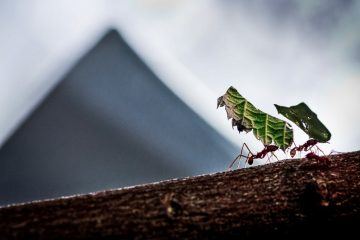Carl Zimmer in The New York Times:
 As a microbiologist, Massimiliano Marvasi has spent years studying how microbes have defeated us. Many pathogens have evolved resistance to penicillin and other antimicrobial drugs, and now public health experts are warning of a global crisis in treating infectious diseases. These days, Dr. Marvasi, a senior researcher at the University of Florence in Italy, finds solace in studying ants. About 240 species of ants grow underground gardens of fungi. They protect their farms against pathogens using powerful chemicals secreted by bacteria on their bodies. Unlike humans, ants are not facing a crisis of antimicrobial resistance. Writing in the journal Trends in Ecology and Evolution, Dr. Marvasi and his colleagues argue that fungus-farming ants could serve as a model for drug development. It’s not just that they have antimicrobials — it’s how they use their drugs.
As a microbiologist, Massimiliano Marvasi has spent years studying how microbes have defeated us. Many pathogens have evolved resistance to penicillin and other antimicrobial drugs, and now public health experts are warning of a global crisis in treating infectious diseases. These days, Dr. Marvasi, a senior researcher at the University of Florence in Italy, finds solace in studying ants. About 240 species of ants grow underground gardens of fungi. They protect their farms against pathogens using powerful chemicals secreted by bacteria on their bodies. Unlike humans, ants are not facing a crisis of antimicrobial resistance. Writing in the journal Trends in Ecology and Evolution, Dr. Marvasi and his colleagues argue that fungus-farming ants could serve as a model for drug development. It’s not just that they have antimicrobials — it’s how they use their drugs.
Fungus-farming ants bring leaves or other debris to gardens in their nests, where certain kinds of fungi thrive. The fungi — which can flourish nowhere else — grow into dense webs that the ants feed to their larvae. But the crops are also attractive to a parasitic fungus called Escovopsis. It attacks the gardens and starves the ants. “It’s a war between the ants and the pathogens for the same food,” Dr. Marvasi said. The ants have powerful allies in this war: bacteria that live on their thoraxes. Worker ants coat eggs with certain strains of these bacteria. As an ant matures, it feeds its personal supply of bacteria with secretions from glands on its thorax. The bacteria pay the ants back for this special care by making powerful antimicrobials that kill Escovopsis, protecting the gardens from destruction.
The fact that bacteria make antimicrobials is hardly surprising. The ones that doctors prescribe today were mostly discovered in the soil, made by microbes. What is surprising is that the chemicals used by the ants work so well.
More here.
